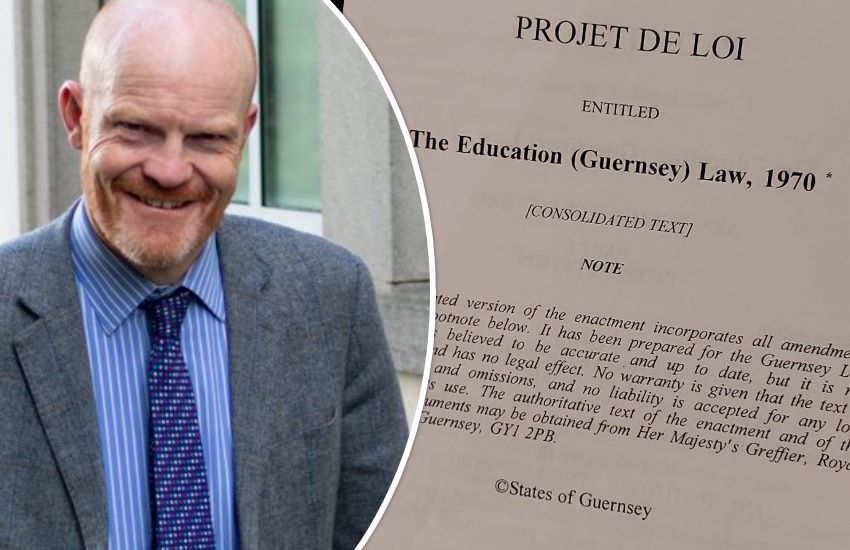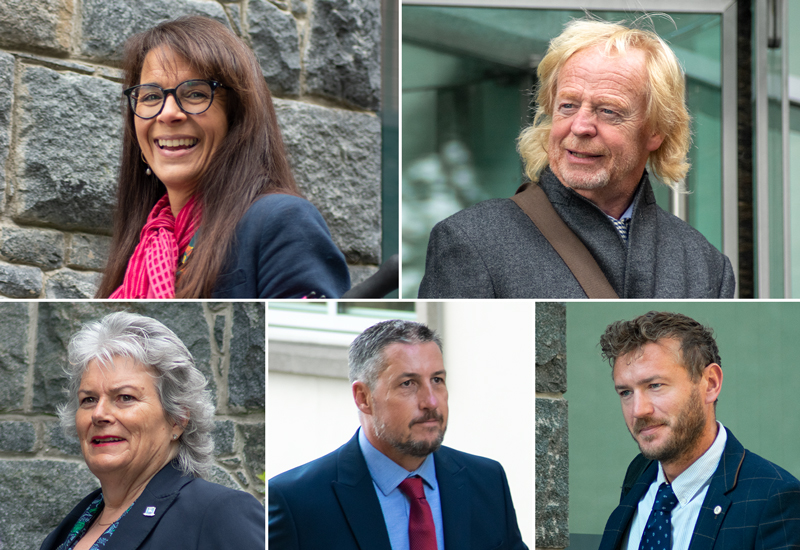


A deputy who is being frustrated in his attempts to get more information published about the island's Education Strategy fears it is "little more than fluff and jargon-ese" and contains "really nothing substantive".
The Committee for Education, Sport & Culture has declined a written request from Deputy Gavin St. Pier to publish 55 action plans which it says sit under its Strategy. The Committee has also declined Deputy St. Pier's request to publish a presentation about the Strategy which was provided to States' members a few weeks ago.
"I don't understand the reluctance to put the presentation on the Education Strategy to States' members in the public domain Having seen it myself, I can see no reason why it should not be published," said Deputy St. Pier, pictured top.
"I suspect I am not alone in sharing the observation of the President [of the Committee for Education, Sport & Culture] in the States in April that the Education Strategy does indeed come across as little more than fluff and jargon-ese. I fear that is the real reason for not publishing the presentation: there really is nothing substantive to see."
The President of the Committee, Deputy Andrea Dudley-Owen, pictured top, said it had recently put more information about the Strategy on the States' website and "is committed to keeping the community updated on the progress being made under the umbrella of the Education Strategy...it will do this via an annual update, the first of which is due to be published in January 2023".
Deputy Dudley-Owen added that the presentation to deputies "in common with many briefings given to States' members from various committees on a wide range of subjects...was an internal update intended to assist States' members in their understanding of the progress being made under the Education Strategy".

Pictured: A presentation on the Education Strategy was made to deputies but the Committee for Education, Sport & Culture has declined requests to make it available to the public.
Deputy St. Pier submitted a total of eight questions for written reply by the Committee.
They included questions on the structure of the Education Office, school premises and caretakers, schools' budgets for revision guides for students, schools' behaviour policies and the time it takes to recruit teachers.
The Bailiff, Richard McMahon, agreed to a request from the Committee for another 15 days to reply to the following two questions from Deputy St. Pier:

Pictured: The Committee was granted another 15 days to answer questions about class sizes and non-specialist teachers.
The Committee did, however, use its replies to Deputy St. Pier's questions to commit to submitting a Policy Letter for the States to debate its review of the 1970 Education Law "in the first half of 2023, following wide-ranging consultation".
More than a decade ago, a review carried out by former head teacher Denis Mulkerrin identified that the 1970 Law left too much power in the hands of the Education Committee and Education Office and was a significant factor inhibiting accountability and leadership and constraining performance in the island's education system. A Policy Letter on rewriting the Law was pulled by the Committee on its election in October 2020 to allow the proposals to be re-examined.
Deputy St. Pier said he was sceptical that the Committee would use its review of the Education Law to decentralise and transfer more responsibilities to schools and school leaders.
He said that the Committee's replies to other questions "indicate clearly to me that we are moving away from rather than towards any recognisable concept of local management of schools...there is more rather than less central control".

Pictured: Deputy Gavin St. Pier would like to see the 1970 Education Law replaced.
Deputy St. Pier asked how key performance indicators for recruitment - such as the time taken to recruit teachers - compared with other roles in the public sector.
In reply, the Committee stated: "A standard ‘time to hire’ key performance indicator is used when recruiting to States' vacancies. However, this is not meaningful in the context of recruitment to vacancies for teachers or head teachers, etc.
"This is because the key performance indicator records the elapsed time between a vacancy being approved for advertising and the successful candidate starting in post. Typically, there is an annual cycle of recruitment within the teaching profession. This cycle means that it is common to make an appointment to a head teacher post in March or April for a vacancy that will arise at the start of the following academic year in September.
"It would be misleading to use the standard key performance indicator, which would record an elapsed recruitment time of five months for such a post. Similarly, for classroom teachers, recruitment generally takes place in May or June for a September start."
Deputy St. Pier was unimpressed with the Committee's approach.
"That suggests it is accepted that hiring takes however long it takes, rather than seeking to drive the whole recruitment process faster to capture the very best candidates," he said.

Pictured: Secondary schools - together with clusters of primary and special schools - now have Premises Managers sitting above the more traditional role of caretaker.
In reply to another question, the Committee explained a new approach to management of school premises under a States-wide initiative to improve the management of property.
"Three Premises Managers work across the States-maintained school sites, under the line management of a dedicated Education Estate Portfolio Manager," said the Committee.
"In alignment with the States-approved policy to create three 11-16 schools, each Premises Manager has under their remit one of those three secondary schools and a cluster of primary and special schools. St Anne’s School in Alderney and La Mare de Carteret High School (which will close to students in July 2025) have also been assigned a Premises Manager under this cluster system.
"Each Premises Manager has reporting to them a team including Site Supervisors, Deputy/Assistant Site Supervisors, Caretakers, Cleaners and supply/relief facilities staff. There has been no overall change to the number of full-time equivalent premises/facilities staff as a result of the introduction of the above model.
"In line with the aims of the combined States' Property Unit, the above premises staff now have access to a wide pool of skills and expertise, which brings with it enhanced resilience to manage periods of absence, better succession planning, timely project delivery and compliance."

Pictured: The written replies from the Committee for Education, Sport & Culture were published late on Thursday.
The full exchange between Deputies St. Pier and Dudley-Owen can be found HERE.
ESC President: "No intention of bringing strategy to the States"
Investment in education is the best investment we can make
New education strategy will not be debated by the States
Deputies may push for States' debate on education strategy
Staff from across education discuss "exciting" new strategy
ESC: Local management of schools "may not necessarily work well here"
Comments
Comments on this story express the views of the commentator only, not Bailiwick Publishing. We are unable to guarantee the accuracy of any of those comments.